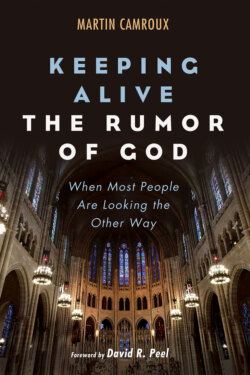Читать книгу Keeping Alive the Rumor of God - Martin Camroux - Страница 4
На сайте Литреса книга снята с продажи.
Foreword
ОглавлениеMartin Camroux belongs to a church tradition which historically has placed a great deal of importance on having a learned ministry in support of its emphasis on preaching. Quality preaching always requires preachers whose holistic learning is rooted in theological acumen, vital spirituality, and practicing what they preach. Mind, heart, and will are all involved in enabling a preacher’s human words to become God’s word for a particular congregation.
Through rigorous theological reflection, spiritual discipline, and his radical commitment to social justice, Martin has become an excellent preacher. His latest book provides us with an account of the theology which undergirds his ministry. Not surprisingly—even helpfully—the style is that of a preacher speaking to a diverse congregation rather than an academic addressing the academy. The book betrays a lifetime of working alongside fellow Christian disciples, ministering to their needs, and sharing their stories; it is peppered with helpful illustrations from literature, poetry, and music, bringing home theological truths beyond conceptual limits; and it is rooted in Martin’s deep concern about the churches’ diminishing role in Western society.
In Ecumenism in Retreat Martin offered an interpretation of his statistical analysis of the URC’s declining membership figures. It led him to be accused of being unduly negative about the URC’s numerical plight, but when one’s denomination has been declining over its lifetime at about 4 percent per year it’s difficult to be positive—it would take an upturn greater than the Evangelical Revival to return the URC to the membership level at its inception in 1972. The process of secularization has now produced a situation in which religion is alien to most people; so, as Steve Bruce has observed, “If there is to be a reversal of secularization, large numbers of the currently non-religious will have to convert.” That is not going to happen without Christians generating a life-enhancing re-statement of Christianity’s original counter-cultural message: What does it mean to be a Christian today if it meant what it did to the first witnesses to Jesus? Alongside an “historic authenticity” our much-needed narrative will need to display a “contemporary credibility,” which in a hard-nosed way can serve as a modern Christian apologia.
Such a narrative will only emerge from the kind of theological reflection Martin has attempted in this book. He laments that the style of theological exploration which generated his early Christian commitment has been increasingly sidelined. Church culture is now dominated by fundamentalism or attempted returns to the supposedly safe harbors of orthodoxy (whether “Ancient,” “Neo” or “Radical”) that steer well away from troubled seas stirred up by the challenges of contemporary ideas and radical social and political movements.
Martin’s insistence that a return to liberal theology is desperately needed is most timely. He is encouraging us to give an account of the hope within us (1 Pet 3:15) that not only avoids some of the question-begging, purported “certainties” of many confessional theologies, but also seriously engages with contemporary atheistic critiques of religion and, to some extent, even the faith claims of non-Christian faiths and ideologies. Our accounts will only pass muster if they address the contemporary issues posed to Christian believing as honestly as we find them tackled in this book.
David R. Peel
